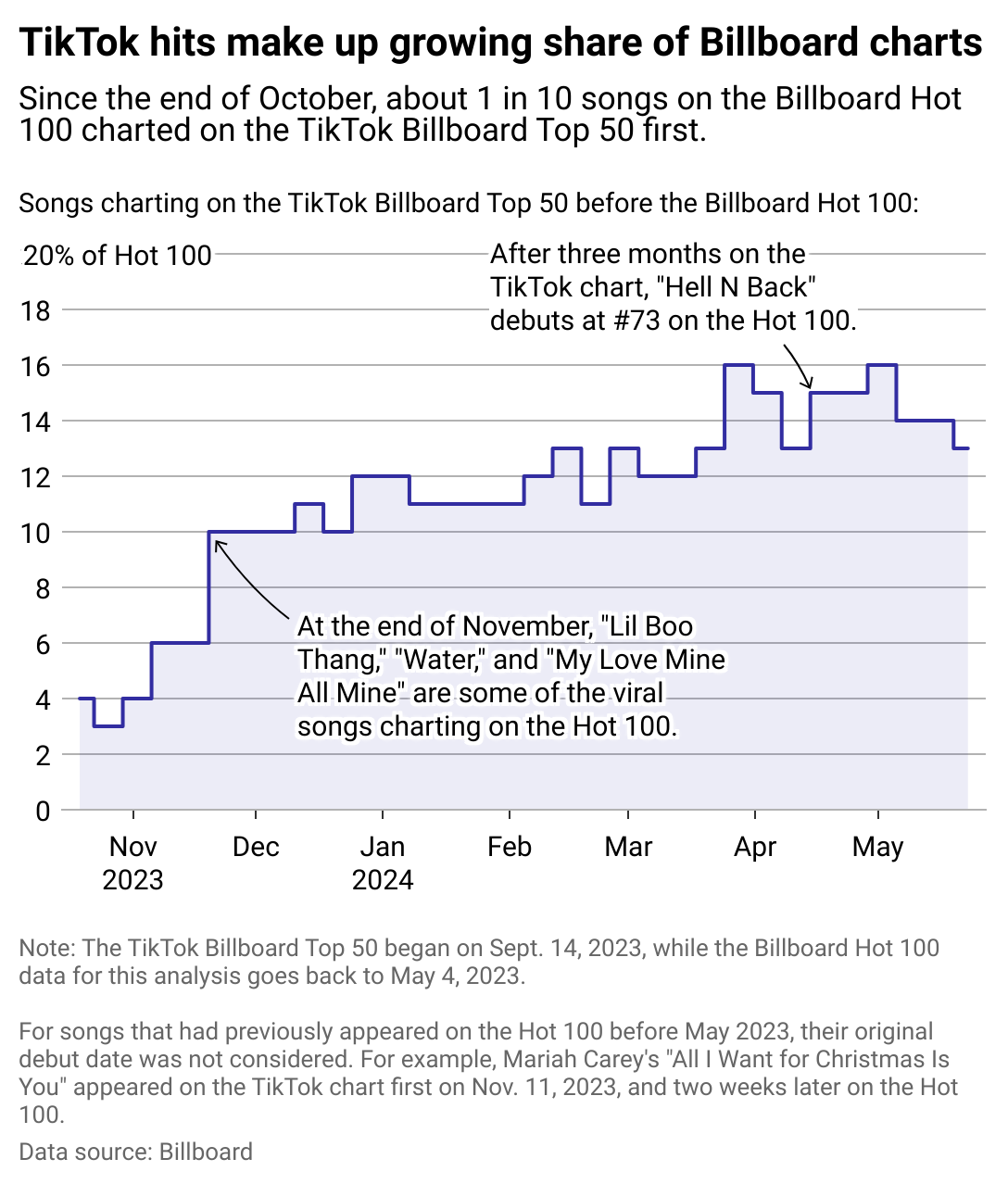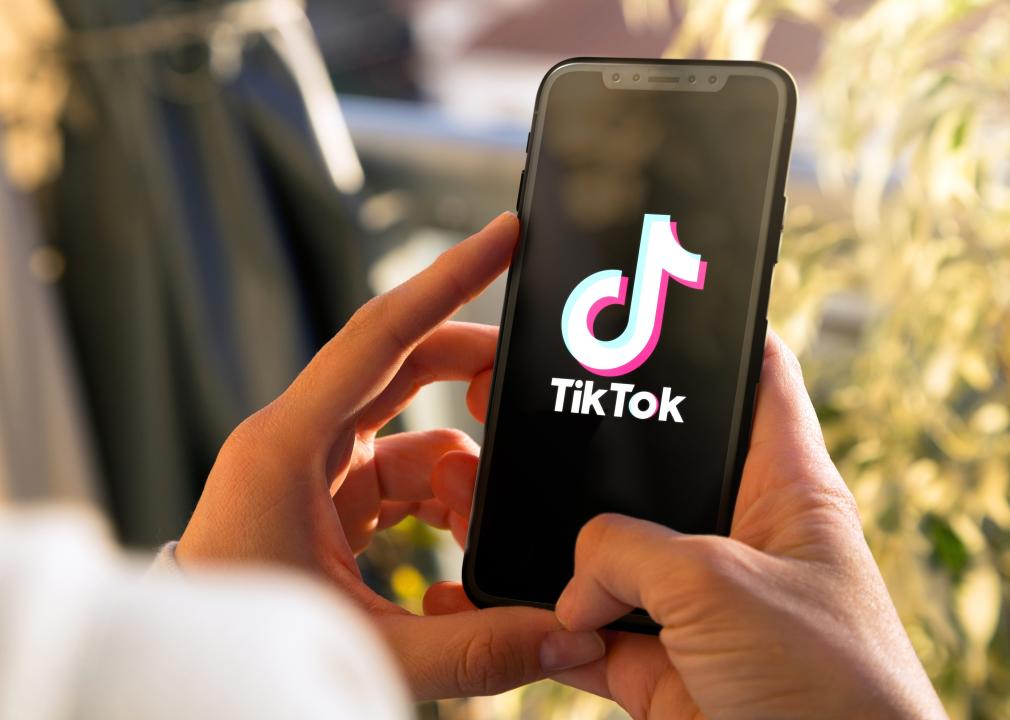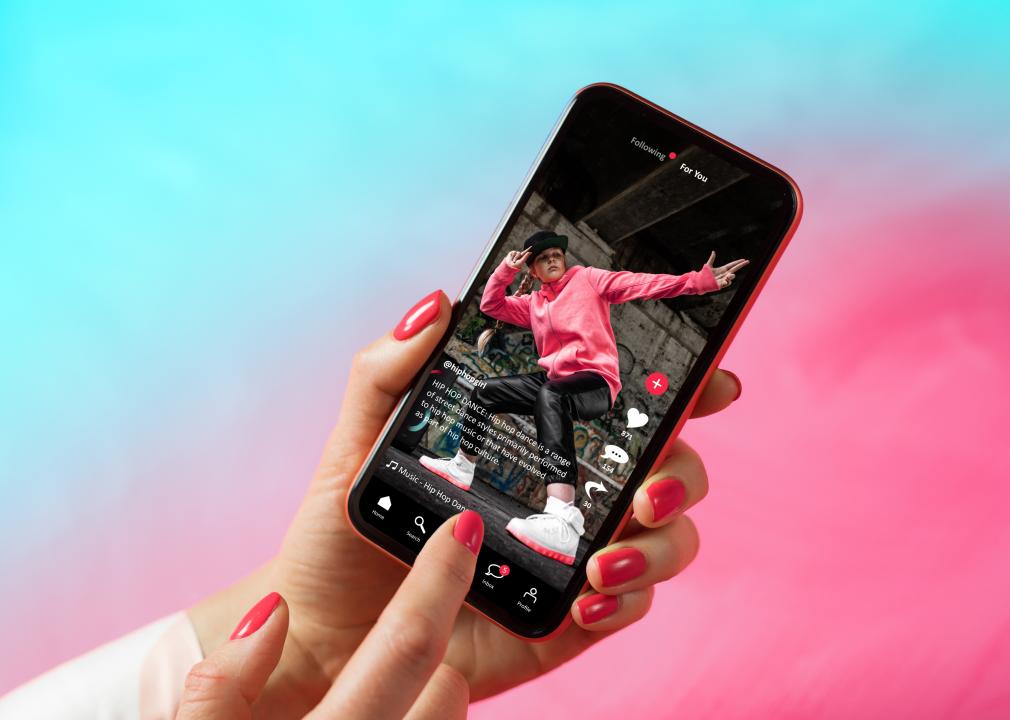How TikTok has changed the music industry
Alex Photo Stock // Shutterstock
How TikTok has changed the music industry
Person holding a smartphone with the TikTok app open.
On Dec. 3, 2018, 19-year-old Atlanta pop artist Lil Nas X opened up TikTok and uploaded his new song, “Old Town Road.” The artist was used to making viral content on the internet, and that savvy was put to good use when his country trap tune quickly started taking over the social media app. Over the next few months, hundreds of thousands of TikTok users turned the song’s chorus into a meme, posting videos of themselves drinking “yee yee” juice and wearing cowboy getups.
“When I became a trending topic on there, it was a crazy moment for me,” he told Time magazine. “A lot of people will try to downplay it, but I saw it as something bigger.”
How could he not? By March 2019, Lil Nas X had signed a record deal with Columbia Records. A month later, the song reached #1 on the Billboard Hot 100. It subsequently became the subject of controversy when Billboard pulled it from its country charts. That April, Nas X collaborated with Billy Ray Cyrus on a remix, which debuted atop the charts. The remix stayed at #1 for 19 straight weeks. Thanks to TikTok, “Old Town Road” became one of the biggest phenomenons in the music industry.
Since then, many artists have followed Lil Nas X’s blueprint for success, turning TikTok into a hit-making hub. The app has produced viral new sensations (Doja Cat’s “Say So,” Glass Animals’ “Heat Waves,” GAYLE’s “abcdefu”) and even revived older songs (Celine Dion’s “It’s All Coming Back to Me Now”), giving them unlikely second acts. No longer just a vehicle for dance videos, it has revolutionized how we discover, share, and interact with music, amplifying streaming totals, elevating talent from obscurity, and aiding awards recognition.
To chronicle its impact, Collabstr used data from Billboard to explore how TikTok is influencing popular music and the music industry at large. Data comes from the top 50 songs on the Billboard Hot 100 and the TikTok Billboard Top 50, which ranks songs based on creations, video views, and engagement.
![]()

Collabstr
Viral TikTok songs are reaching mainstream popularity
Chart showing TikTok hits make up steady share of Billboard’s charts, averaging around 18% from September 14, 2023, through May 16, 2024. The first TikTok Top 50 chart placed “Paint the Town Red” by Doja Cat at #2 as it was simultaneously charting #1 on the Billboard Hot 100.
Until it was acquired by a Chinese tech company in 2018, TikTok operated as a lip-synching video platform called Musical.ly. But even after switching names and changing its primary function, TikTok kept the spirit of its musical roots, growing exponentially and shaping the music landscape with it.
In September 2023, the social platform and Billboard announced the launch of the official TikTok Billboard Top 50, a weekly chart comprising the most popular songs on the app. It’s no surprise to Gen Zers that TikTok’s top-performing songs often cross over into the mainstream rankings. Since the chart’s debut on Sept. 14, 2023, popular TikTok songs have quickly claimed a growing share of the Hot 100 over the last six months. By April, nearly 1 in 6 songs (including Cardi B’s “Enough (Miami),” Jack Harlow’s “Lovin on Me,” and, more recently, Dasha’s “Austin”) was charting on the Hot 100 after debuting on the TikTok Top 50 first.
Artists have increasingly utilized this momentous strategy, debuting songs on TikTok in the hope that they will leak onto the main Billboard charts.
Some of these songs have risen organically through the app, but the music industry is now playing the game too. Marketers have targeted TikTok, hiring influencers to amplify songs and promote user-generated content from fans. The social platform is also working with artists and labels to keep revenue coming in, building out its own music streaming service, TikTok Music, and organizing live, in-person concerts, the first of which took place in Arizona in December 2023 and featured popular TikTok artists such as Cardi B and Charlie Puth.
What’s different about TikTok music is the level of interaction from its users. In a May 2022 NPR interview, analyst Tatiana Cirisano compiled consumer behavior data and found that TikTok users were more likely to spend money on music, citing that “40% of active TikTok users pay a monthly subscription for music, compared to 25% of the general population.” They’re even more likely to buy an artist’s merchandise. Nowadays, artists have to spend just as much time making music as they do cultivating an online presence.
Kaspars Grinvalds // Shutterstock
With TikTok’s future unknown, how will artists and the music industry adapt?
TikTok interface on smartphone playing a video.
Near the beginning of 2024, TikTok sounded a bit quieter. In an effort to negotiate a more lucrative licensing agreement, Universal Music Group began removing its songs—stripping hits by the Weeknd, Ariana Grande, and Olivia Rodrigo—from the app.
Universal had three primary sticking points: better compensation for artists and songwriters, protections from hate speech and harassment, and regulations on music creation via artificial intelligence. The stalemate—similar to Hollywood’s 2023 SAG-AFTRA and writers’ strikes—was tough for many artists wanting more royalties and safeguards for their peers but potentially at the cost of hurting their careers.
Three months later, Variety reported that both entities had reached a new deal to bring the label’s music back to TikTok, with both companies stating they would “deliver improved remuneration for UMG’s songwriters and artists, new promotional and engagement opportunities for their recordings and songs and industry-leading protections with respect to generative AI.” In addition, they will collaborate on “new monetization opportunities utilizing TikTok’s growing e-commerce capabilities.”
That three-month interruption further highlighted the landmines littered throughout the streaming era. But it pales compared to a much more foreboding and existential problem within the music industry: TikTok getting banned.
In late April 2024, the U.S. Senate passed a bill that would ban the Chinese-owned app unless it’s sold to a U.S. buyer in the next year, citing concerns about data security and foreign influence. The decision will likely be challenged in court, but how would the potential ban impact the music industry and TikTok’s 170 million American users?
Well, negatively.
The app’s mass appeal has increased streams and downloads, leading to more royalties. It’s become a petri dish for trends and viral content, influencing musical styles and catapulting new tracks. Without TikTok, artists would lose both their creative and marketing opportunities and the platform many use for experimentation and collaboration. Considering TikTok’s licensing agreements and revenue streams have provided economic stability, the move could also disrupt the financial opportunities for those looking to stay in the industry.
The possible loss of TikTok has highlighted the need for artists to keep extending their online presence. Apps, algorithms, and audiences are here today but easily gone tomorrow. “Artists should have unlearned having one platform being their main vehicle,” Sarah Flanagan, a former senior director of digital marketing at Columbia Records, told The Los Angeles Times.
“I knew people with massive Instagram audiences, and suddenly they change their algorithm and you can’t reach your followers,” she added. “You have to make sure you have email, texting, Discord, Substack, all of that. Trends change so quickly, you need to be able to transfer your superfans to other platforms.”
More touring may be an alternative, for both revenue purposes and publicity, a way of connecting with fans in both large-scale and personal environments. In addition to their artists leaning into other social media and online platforms, labels might also consider turning to more traditional marketing channels like television and radio, although they may not offer the same engagement opportunities as online platforms.
It’s difficult to know to what extent a ban would shake up the artists, labels, fans, and larger landscape, but one thing is clear: TikTok and its innovative community have substantially changed how music is discovered and sold. Its fortunes will undoubtedly continue to shape the industry in the future.
Story editing by Carren Jao. Additional editing by Kelly Glass. Copy editing by Paris Close. Photo selection by Clarese Moller.
This story originally appeared on Collabstr and was produced and
distributed in partnership with Stacker Studio.

